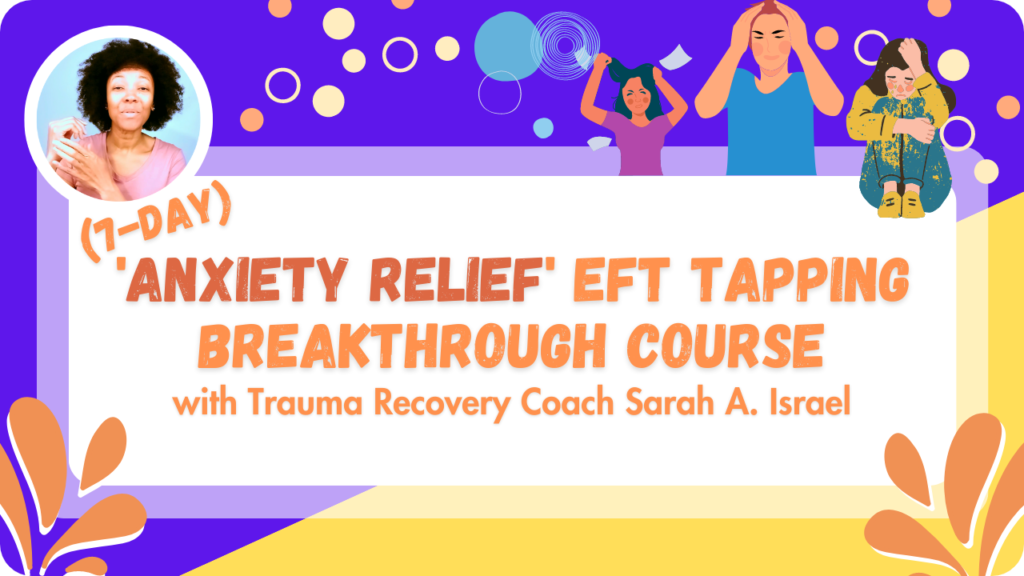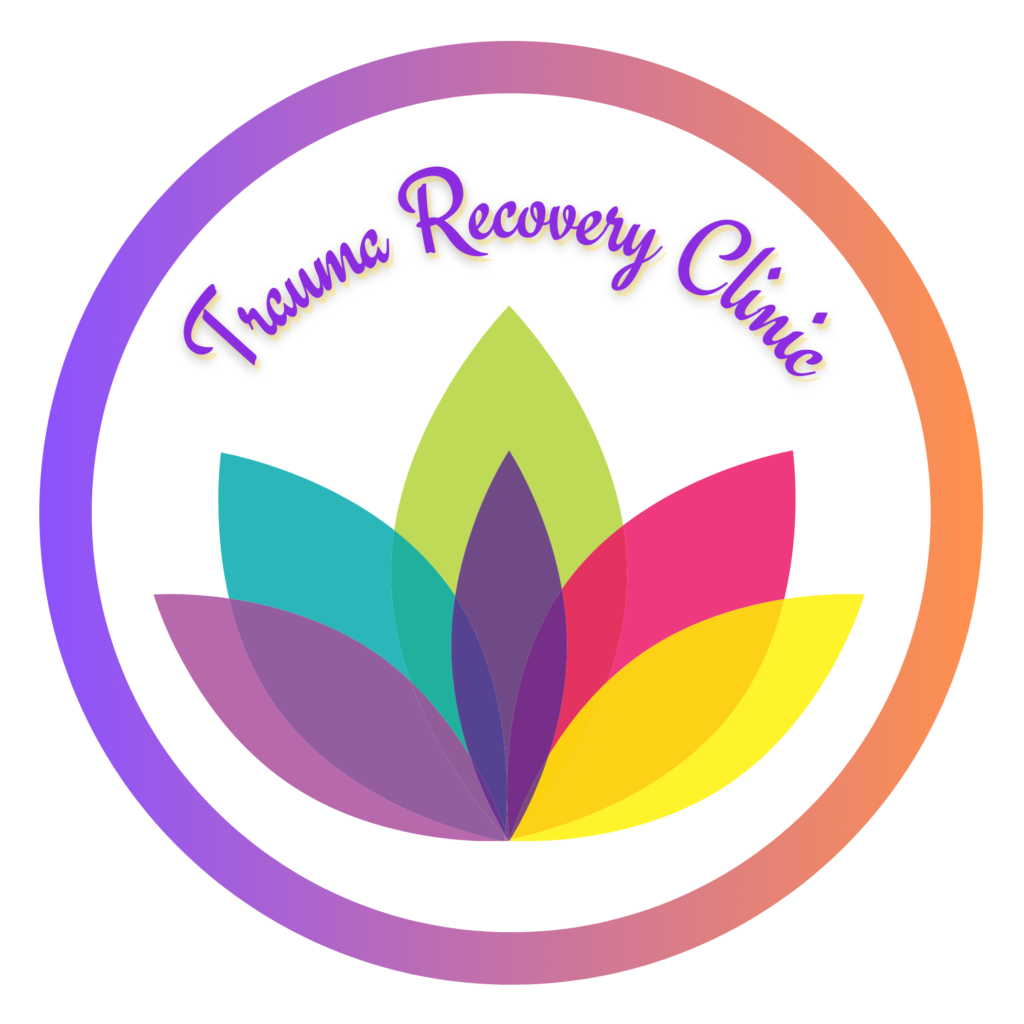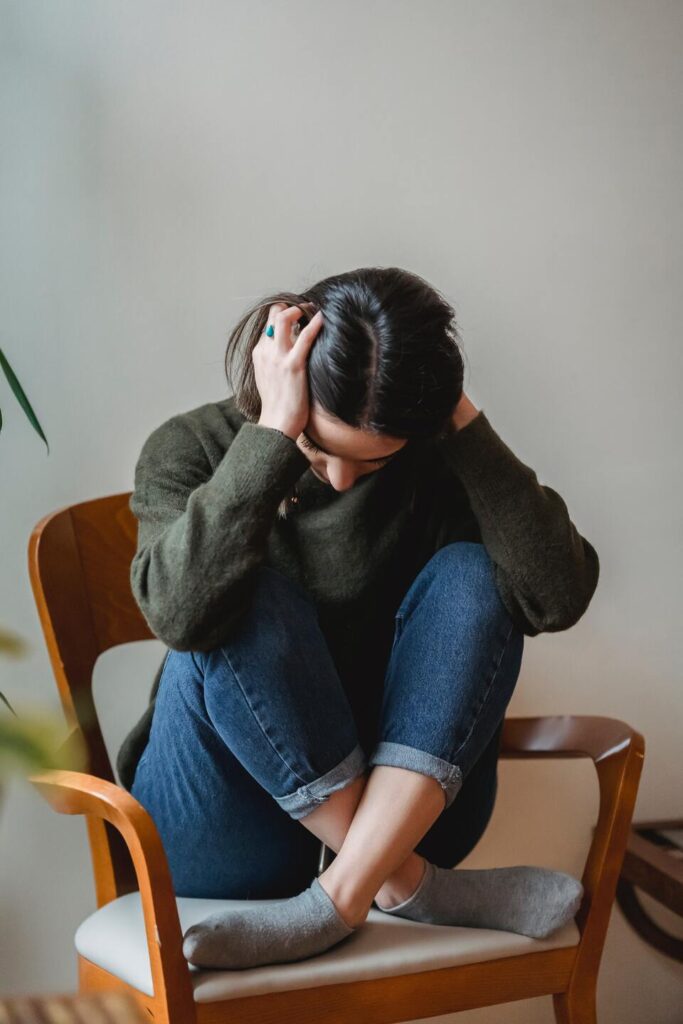The gut-wrenching dread of going through yet another panicky situation…. You can already feel yourself sweating, heart racing and breaths quickening. If you could get out of the situation you would. Just the thought of it is almost too much to bear.

So, you avoid making that phone call where you know you’ll have to deal with that difficult person. You skip going to the gym because you still feel fat and you don’t want to feel socially awkward. Instead of enrolling in the course that could lead to a job promotion, you avoid it because you don’t want to have to participate in the group activities that are a part of the course.
What I’m talking about here is called avoidance. It’s extremely common to want to avoid things that you think may cause you pain (like public speaking). But, the problem with avoidance is that it causes the underlying anxiety to worsen.
What You Need to Know About Anxiety and Avoidance
When you don’t deal with the existing anxious thoughts and feelings that are causing avoidance, it makes your anxiety act up even more. Anxious feelings are your body’s warning system to let you know that something is off balance.
If you ignore those signals, your body will go into overdrive attempting to strongly alert you to the imbalances. This is why it’s more harmful to avoid dealing with things rather than facing them. You see, the problem won’t go away just because you are choosing to ignore it. It will simply find another way to get your attention. Consequently, physical ailments, illnesses and diseases may show up in your body to get your attention.
What happens when you have been in a state of avoidance is that the issue will become even harder to deal with. In the beginning, you may have been afraid to be on the upper level of a tall building. So, then you begin to avoid being in any kind of multi-level building (even if it’s a store or an apartment that you need to get to).
Over time, you will even become afraid to be in any type of similar building, even if it’s only a one-level building. If any building even somewhat resembles the tall building that you avoided (even though it’s at ground level in reality), it will cause you to feel panic and anxiousness.
Anxiety Avoidance Negatively Affects Your Brain
With avoidance, your mind will begin to believe that you can’t handle the particular circumstance that you’ve been avoiding. In this way, avoidance only reinforces negative and depressing feelings that you don’t want to feel. Believing that you can’t deal with certain pressures will lower your self-confidence and increase your anxiety.
We humans are driven by either pleasure or pain. If we believe that something will be good for us or be pleasurable, it can motivate us to move towards that thing. However, when we fear that something will be hurtful or painful, it can make us want to stay away from it and avoid it.
……………………………………………………………………………………
7-Day Anxiety Relief EFT Tapping eCourse
Break free from the grip of anxiety and depression with 7 super-powerful coping strategies. Finally be able to take control of your emotions, ground yourself and find the stability you’ve been searching for. Don’t let anxiety hold you back any longer—start your journey to emotional freedom today.
 Trauma Coach Sarah A. Israel’s online course, anxiety relief options in Australia
Trauma Coach Sarah A. Israel’s online course, anxiety relief options in Australia
……………………………………………………………………………………
Anxiety is when you are either fearing an event or situation that has happened in the past, or you are worried about something that might happen in the future. To be anxious means that you’re not living in the present moment because your mind is plagued with worrisome thoughts about the past or future. Anxiousness takes your mind away from being in the here and now since it causes you to feel a sense of impending doom or danger. So, avoidance is attempting to get away from the uncomfortable feelings of anxiousness or nervousness.
Ways that People With Anxiety Avoid Things (Avoidance)
Avoidance can be an indicator of anxiety, depression or PTSD. One component of avoidance is feeling that you won’t be able to control your emotions if something bad happens. So, you tell yourself that you have to avoid it in order to stay safe.
Here are some signs that you might be in a state of avoidance:
- Staying away from any scary or stressful situation
- Keeping very busy and distracted so you won’t think about problems
- Not going to social gatherings for fear of being awkward
- Avoiding large crowds of people because it feels overwhelming
- Refusing to go to important meetings where there will be difficult people
- Staying indoors inside the house for fear of the “world out there”
- Minimizing an issue or refusing to think about the problem
How to Regulate Your Anxiety So You Can Deal
Here are several ways that you can get a handle on your anxious emotions, so that you’re not tempted to get into avoidance:
Write About It
Journaling or writing about the feelings or situations you’ve been avoiding can help you to find a sense of control over that issue. On one side of the paper make a list of every fear, problem or worry you have about that issue.
On the other side of the page, list out all of the positive things that could happen. Go line by line and cross out all of the negative things. Then circle all of the positive things you listed.
Next, on the bottom of the page or on the backside of the paper, write a list of all the things that you actually do want to happen. Finally, underline each of the good things that you are now intending.
Doing this simple process begins to retrain your mind to have more optimistic expectations of future situations. As you focus more of your energy into the good things that you actually want, instead of the bad things you’re fearing, you’ll begin to attract more of the good things to yourself.
Focused Visualization
Forming a mental vision of a situation going well for you can help you to bring about the circumstances to make it happen. You may want to find a quiet place, close your eyes and relax for a few minutes.
Bring to mind a time when something was very upsetting or distressing to you. Compare that to a similar situation that was easier to handle than you initially thought.
Now, remember another time when a situation was challenging (yet you were able to cope and get through it). What exactly did you do in that situation to get through it? Visualize it in your mind and relive it like you’re watching a movie screen.
By doing this visualization exercise, you are training your brain to remember, reinforce and focus on your ability to cope with stressful situations. Day by day, repeat this visualization as many times as possible until you feel more able to handle the thing that you were originally avoiding.
Call for Backup Support
Ask a friend, counsellor or mental health professional to help you through the thing that you are fearing. Even though you might be feeling worried, anxious or depressed, you don’t have to face it alone.
If you are afraid to be in large crowds, find someone to help you get over that fear. Maybe you are worried about feeling awkward in social settings. If so, then ask a more confident friend to go with you to an event. If you’re in fear of leaving your house (because the outside world feels scary), ask a trained therapist, to help you with exposure therapy, to decrease your fears and help you to feel safer going outdoors again.
Anxiety Relief Options in Australia: Coaching with Sarah
 Back when I first began dealing with my own anxiety and depression, I was avoiding many unpleasant people and situations. I thought that I was better off dealing with my struggles on my own. I knew that I would figure my way out eventually and I felt more comfortable going through it that way.
Back when I first began dealing with my own anxiety and depression, I was avoiding many unpleasant people and situations. I thought that I was better off dealing with my struggles on my own. I knew that I would figure my way out eventually and I felt more comfortable going through it that way.
Yet, as I began to heal emotionally, I learned that I would have to find some healthy ways to face the challenges that I’d been avoiding.
As I’ve journeyed my way to recovery, I began deep studies into mental health and re-fueled my purpose to helping others through my story.
Soon after, I became a Certified Trauma Recovery Coach and EFT Practitioner possessing many skills, healing modalities and anxiety relief options in australia.
I bring a client-centered, “tough love” coaching style where I can guarantee you the anxiety relief results you’re seeking. I will help you to uncover your subconscious self-sabotaging habits, break through the mind chatter of your “inner critic,” guide you through setting and reaching healthy lifestyle goals and hold you accountable to your values.
Reach out to me for my proven anxiety coaching packages at THE SARAH METHOD.
Coach Sarah’s anxiety relief options in australia:
Free Online EFT Tapping Anxiety Course: https://meditationswithsarah.com/free-stuff
One-On-One Anxiety Coaching: https://meditationswithsarah.com/anxiety-coaching-packages
